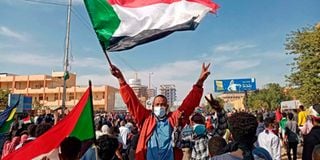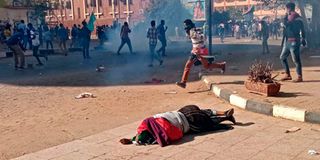Premium
Security forces deployed in Khartoum ahead of planned anti-coup demos

A Sudanese protester waves the national flag during a rally to mark three years since the start of mass demonstrations that led to the ouster of strongman Omar al-Bashir, in the capital Khartoum on December 19, 2021.
What you need to know:
- Khartoum's state governor has warned that security forces "will deal with those who break the law and create chaos".
- Bridges connecting Khartoum across the Nile river to the cities of Omdurman and North Khartoum were shut since Friday evening.
Sudan cut phone lines and restricted internet ahead of planned mass protests Saturday against a military coup, as security forces deployed across Khartoum blocking bridges connecting the capital to suburbs.
At least 48 people have died in crackdowns during weeks of protests, according to the independent Doctors' Committee, and Khartoum's state governor has warned that security forces "will deal with those who break the law and create chaos".
Activists, who use the internet for organising demonstrations and broadcasting live footage of the rallies, had planned the latest in a series of street protests for Saturday -- two months on since generals launched their October 25 takeover.
Military chief General Abdel Fattah al-Burhan held civilian leader Prime Minister Abdalla Hamdok under effective house arrest for weeks, but reinstated him on November 21 under a deal promising elections for July 2023.
The move alienated many of Hamdok's pro-democracy supporters, who dismissed it as providing a cloak of legitimacy for Burhan's coup.
Protesters online have called for fresh rallies, encouraging supporters with the slogans "no negotiations" with the army, and demanding "the soldiers go back to barracks".

A wounded Sudanese protester lies on the ground after security forces fired tear gas during a rally to mark three years since the start of mass demonstrations that led to the ouster of strongman Omar al-Bashir, in the capital Khartoum on December 19, 2021.
But bridges connecting Khartoum across the Nile river to the cities of Omdurman and North Khartoum were shut since Friday evening, and web monitoring group NetBlocks reported mobile internet was cut at sunrise on Saturday.
Security forces also blocked the main streets in central Khartoum where the protest organisers were planning to hold the demonstrations.
Activists reported the arrest of several colleagues beginning Friday night, and Volker Perthes, the UN special envoy to Sudan, urged the authorities to "protect" the protests not to stop them.
"Freedom of expression is a human right," Perthes said Saturday, adding that it includes "full access" to the internet. "No one should be arrested for his or her intention to protest peacefully."
"We draw the attention of the world and ask them to monitor what happens in Sudan on the issue of the revolutionary movement for freedom and democracy", said the Doctors' Committee, which is part of the pro-democracy movement.
Recent protests have seen thousands gather at key government buildings, including outside parliament, the presidential palace and the army headquarters.
Khartoum's governor warned that "approaching or attacking buildings of strategic sovereignty is punishable by law".
Mass demonstrations
At rallies last Sunday, held on the third anniversary of mass demonstrations that led to the ouster of veteran strongman Omar al-Bashir, crowds began a "sit-in" protest outside the presidential palace.
Within hours, security forces dispersed the thousands of protesters with truncheons and firing tear gas canisters.
Activists have condemned sexual attacks during those protests, in which the UN said at least 13 women and girls were raped.
The European Union and the United States issued a joint statement Thursday condemning the use of sexual violence "as a weapon to drive women away from demonstrations and silence their voices".
Sudan, one of the world's poorest countries, has a long history of military coups, enjoying only rare interludes of democratic rule since independence in 1956.
Over 14 million people, a third of Sudan's population, will need humanitarian aid next year, according to the UN Office for the Coordination of Humanitarian Affairs, the highest level for a decade.
Activists say more demonstrations are planned for December 30.




